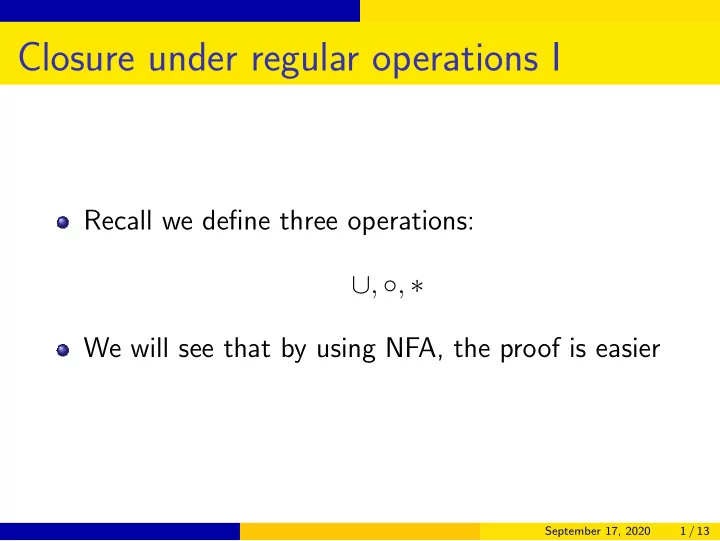

Closure under regular operations I Recall we define three operations: ∪ , ◦ , ∗ We will see that by using NFA, the proof is easier September 17, 2020 1 / 13
Union I Given two regular languages A 1 , A 2 under the same Σ Is A 1 ∪ A 2 regular? To prove that a language is regular, by definition, it should be accepted by one DFA (or an NFA) We will construct an NFA for A 1 ∪ A 2 Assume A 1 and A 2 are recognized by two NFAs N 1 and N 2 , respectively N 1 N 2 q 1 q 2 September 17, 2020 2 / 13
Union II q 1 ǫ q 0 ǫ q 2 Formal definition September 17, 2020 3 / 13
Union III Two NFAs: N 1 = ( Q 1 , Σ , δ 1 , q 1 , F 1 ) N 2 = ( Q 2 , Σ , δ 2 , q 2 , F 2 ) ∈ Σ Note for NFA, ǫ / September 17, 2020 4 / 13
Union IV New NFA Q = Q 1 ∪ Q 2 ∪ { q 0 } q = q 0 F = F 1 ∪ F 2 δ 1 ( q , a ) q ∈ Q 1 q ∈ Q 2 δ 2 ( q , a ) δ ( q , a ) = { q 1 , q 2 } q = q 0 and a = ǫ ∅ q = q 0 and a � = ǫ September 17, 2020 5 / 13
Union V The last case of δ is easily neglected September 17, 2020 6 / 13
Closed Under Concatenation I Given two NFAs N 1 N 2 Idea: from any accept state of N 1 , add an ǫ link to q 2 (start state of N 2 ) The new machine: September 17, 2020 7 / 13
Closed Under Concatenation II ǫ ǫ Formal definition. Given two automata ( Q 1 , Σ , δ 1 , q 1 , F 1 ) ( Q 2 , Σ , δ 2 , q 2 , F 2 ) September 17, 2020 8 / 13
Closed Under Concatenation III New machine Q = Q 1 ∪ Q 2 q 0 = q 1 F = F 2 δ function: δ 1 ( q , a ) q ∈ Q 1 \ F 1 δ 2 ( q , a ) q ∈ Q 2 δ ( q , a ) = δ 1 ( q , ǫ ) ∪ { q 2 } q ∈ F 1 , a = ǫ q ∈ F 1 , a � = ǫ δ 1 ( q , a ) September 17, 2020 9 / 13
Closed under star I Given the following machine Recall the star operation is defined as follows A ∗ = { x 1 · · · x k | k ≥ 0 , x i ∈ A } How about the following diagram September 17, 2020 10 / 13
Closed under star II ǫ ǫ The problem is that ǫ may not be accepted How about making the start state an accepting one ǫ ǫ September 17, 2020 11 / 13
Closed under star III This may make the machine to accept strings not in A A correct setting ǫ ǫ ǫ Formal definition Given the machine ( Q 1 , Σ , δ 1 , q 1 , F 1 ) September 17, 2020 12 / 13
Closed under star IV New machine: Q = Q 1 ∪ { q 0 } q 0 : new start state F = F 1 ∪ { q 0 } δ 1 ( q , a ) q ∈ Q 1 \ F 1 δ 1 ( q , a ) ∪ { q 1 } q ∈ F 1 , a = ǫ δ ( q , a ) = q ∈ F 1 , a � = ǫ δ 1 ( q , a ) { q 1 } q = q 0 , a = ǫ ∅ q = q 0 , a � = ǫ September 17, 2020 13 / 13
Recommend
More recommend